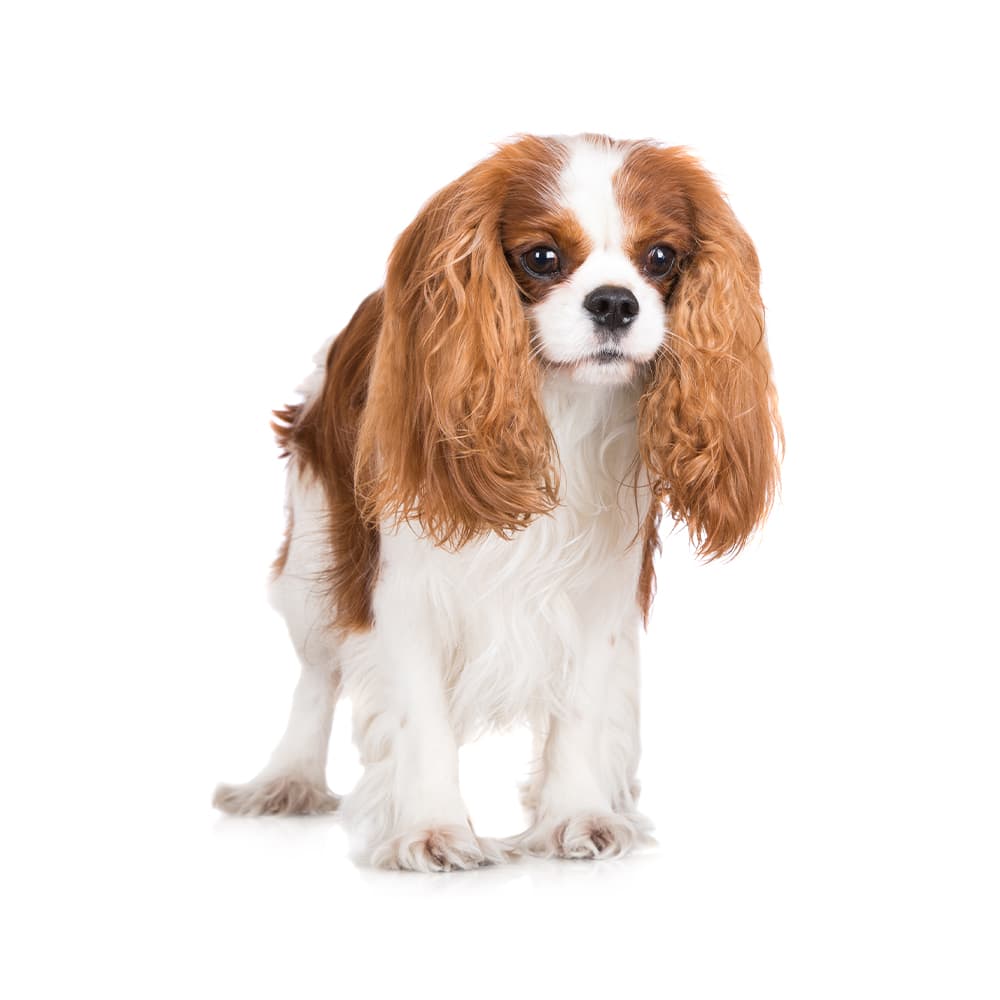Discover your dog's connection to this breed and 200+ others


Discover your dog's connection to this breed and 200+ others



The Cavalier King Charles Spaniel is a small dog breed that is highly revered for its elegant looks, engaging personality, and warm-hearted affection. They were named after King Charles II of England as they were a favorite breed in the royal court during the 16th and 17th centuries. They were bred to keep the ladies of the court warm and were also used as lap and foot warmers. The Cavalier we know today was created in the early 20th century by American breeders who wanted to recreate the type of spaniel frequently seen in paintings from the Renaissance era.
Cavalier King Charles Spaniels are prone to eye disorders such as progressive rod-cone degeneration, congenital keratoconjunctivitis sicca and ichthyosiform dermatosis (CKSID), and cataracts. They can suffer from hip dysplasia, skeletal dysplasia 2 (dwarfism), a neurological condition called syringomyelia, heart conditions such as mitral valve heart disease, patellar luxation, degenerative myelopathy, hyperuricosuria, and chondrodystrophy and intervertebral disc disease (CDDY and IVDD risk) with or without chondrodysplasia (CDPA). Another specific genetic condition for which this breed should be tested is episodic falling syndrome, also called collapsing/falling Cavaliers syndrome. As for all breeds, genetic screening is recommended to assist veterinarians with diagnosis and proactive care, as well as help breeders identify affected and carrier dogs.
The Cavalier King Charles Spaniel is friendly, easygoing, and typically gets along with everyone they meet, including strangers, children, and other animals. They are also known to be incredibly affectionate and are often referred to as 'love sponges' due to their fondness for cuddling. Despite their small size, they are sporty dogs who enjoy a good chase or a game of fetch, and require moderate daily exercise to stay healthy and happy.
However, due to their strong attachment to their human families, they do not like to be left alone for long periods and can suffer from separation anxiety. As such, they are best suited to households where someone is home for most of the day or can take them along on outings.
Cavaliers are also intelligent and eager to please, which makes them relatively easy to train. However, they are sensitive dogs, so gentle, positive reinforcement methods work best. Overall, their affable nature and adaptability make them excellent companions for families, seniors, and singles alike.
A canine genetic lineage is a group of individuals or entire breeds that descended from common ancestors predating modern breed formation. Often these lineages are associated with a ‘type’ of dog with a unique historical working role and associated behaviors (e.g., herding, scent hunting, etc.).
The Pointer-Spaniel lineage encompasses both pointer and spaniel breeds. They were both bred for their specialized hunting abilities in Europe. Pointers locate game and freeze in a stance, called “pointing”, to indicate to their hunter that birds are close by. Spaniels were bred to find game in underbrush and retrieve it. Both pointer and spaniel breeds were bred to enhance their strong senses, trainability, and endurance as these are advantageous in a hunting partner. Spaniels and pointers are known for their strong work ethic, ability to work closely with humans and agility. These dogs’ ability to work closely with their hunters makes them an asset during a hunt because they follow direction well and know how their hunters want them to proceed.
Example breeds with ancestry from this lineage include English Cocker Spaniel, Irish Red Setter, and German Shorthaired Pointer.
This breed was the favorite of King Charles I of Britain. However, when the house of Stuart fell, owning these dogs became a political liability and so they fell out of favor.
A Cavalier King Charles Spaniel named Elizabeth Taylor achieved notoriety on HBO's "Sex and the City" show. She was owned by one of the main characters, Charlotte York.
The Cavalier is the American Kennel Club's (AKC) 140th breed.
Each of this breed's four distinct coat colors were historically associated with specific noble families throughout England.
https://www.akc.org/dog-breeds/cavalier-king-charles-spaniel/ https://ofa.org/chic-programs/browse-by-breed/?breed=KCS https://pubmed.ncbi.nlm.nih.gov/16961470/ https://www.pawprintgenetics.com/products/breeds/56/ https://vgl.ucdavis.edu/breed/cavalier-king-charles-spaniel?page=1
Recommended by top vets with decades of experience
21 breeds
64 genetic health markers
50 genetic trait markers
